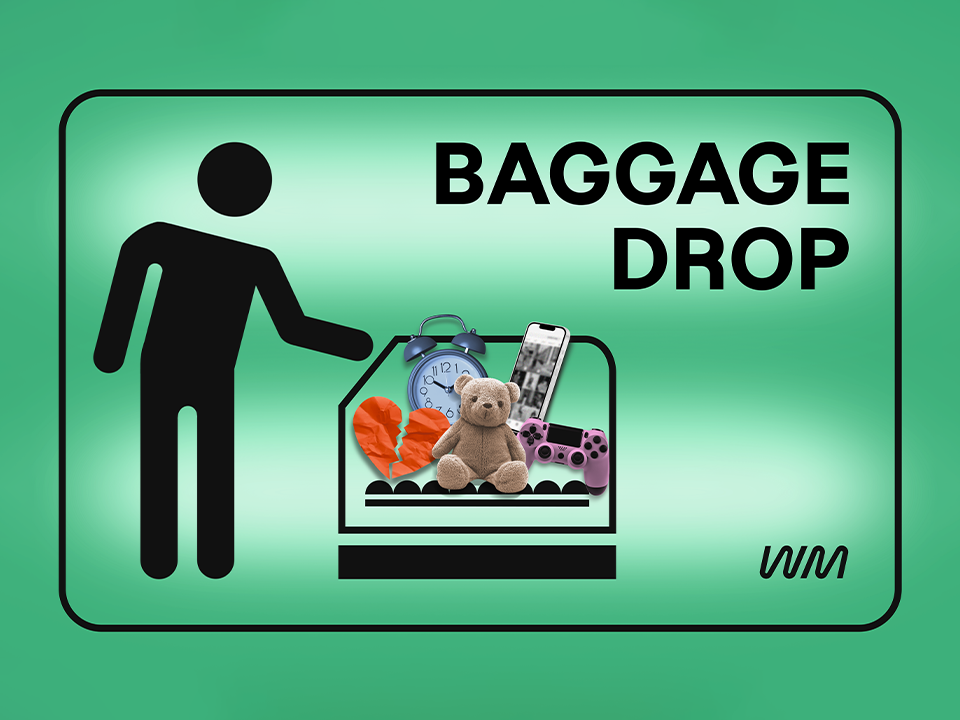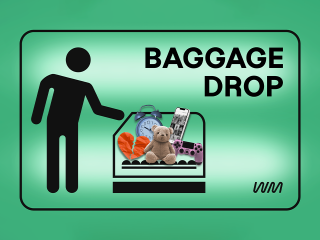Step 8 | Practical Pivots: When to Stop


Alo Johnston, LMFT
Licensed marriage and family therapist and writer in Los Angeles, specializing in working with the transgender, queer, and non-monogamous communities
Alo Johnston, LMFT, continues week three with an honest check-in on our current goals’ alignment with our values. It’s great if goals and values are a good fit, but even if the two don’t quite match, Alo shares an exercise on using practical pivots when facing roadblocks, instead of quitting entirely.
Download the How to Break Through Roadblocks worksheet!
Learn more about Alo Johnston, LMFT
Check out Alo’s book Am I Trans Enough?
(BAGGAGE DROP THEME BEGINS)
ALO JOHNSTON, LMFT, HOST: Hey, I'm Alo Johnston, and this is Baggage Drop: the show designed to help you let go of what weighs you down so that you can reach higher heights when it comes to your mental health. This is episode eight of Wondermind’s Baggage Drop.
(MUSIC BEGINS)
OK, friends. We're friends now, right? Let's revisit recognizing our whys and how they relate to habit stacking. I don't want to get too pedantic, but if you have a pen or pencil handy, you may want to take some notes as you listen to this episode. But if not, you're always free to circle back and relisten. On Monday we talked about habit stacking, ensuring we've got internal motivations, and we explored combining new habits with existing ones to lighten your cognitive load. Also, we explored letting go of limiting thoughts or “should” statements that keep you from making more aligned moves. Today, we'll build on the content of Monday's episode, so feel free to circle back if you need to.
Now for a bit of a check-in. For those of you who've had time, how did stacking your habits play out since Monday? Do you feel you’re making progress towards your week one goals? Like Dr. Stern taught us, ask yourself, “Do my habits still align with my why?” And from Dr. Howes in week two, “Does my support fit the life I intend to lead?” Keep asking those questions. They always help.
Now let’s hit those tough questions. Are there habits that might not fit your values? Have you run into barriers you can't seem to solve or cope with? Here's what our community told us about sticking with their healthy habits:
(MUSIC BEGINS)
PIA GLENN, PRODUCER: Is there a new healthy habit you're starting?
[VOICE CLIP 1]: Just trying to get back into cycling regularly.
PIA: And so you're saying that you used to have a regular regimen?
[VOICE CLIP 1]: Yeah. And then I had a knee injury and so now I'm back to building it back up again.
PIA: Besides physical pain, is there anything that's stopping you from? You know that you can identify what's getting in your way.
[VOICE CLIP 1]: Oh, it's probably just, being self motivated, isn't it? Which is, I think, the hardest thing, building up a good habit.
PIA: They say it takes like a month.
[VOICE CLIP 1]: Yeah, definitely. And then you have a break and then you've got to redo it again.
PIA: Do you have any particular healthy goals you're working on for yourself?
[VOICE CLIP 2]: Oh, I mean, I'm always trying to just eat better and exercise more.
PIA: What are you doing specifically?
[VOICE CLIP 2]: I'm just being mindful of what I eat and trying to pick, like, whole organic foods when available.
PIA: And then, what is something that gets in the way?
[VOICE CLIP 2]: Oh, alcohol.
PIA: Hey now. OK, yeah. Partying?
[VOICE CLIP 2]: Oh, I think just, not even that. Just the nightly, or semi-nightly, glass of wine.
[VOICE CLIP 3]: My goal is just to be healthy in general, you know, every day.
PIA: Physically, mentally, all of it?
[VOICE CLIP 3]: All of it in one.
PIA: What's an obstacle you can pinpoint?
[VOICE CLIP 3]: Leaving, like, chicken and fish alone, totally.
PIA: OK, so we're talking going full vegetarian?
[VOICE CLIP 3]: Yeah, kind of like, vegan almost, because I'm trying to leave animal byproducts and everything alone, you know? But it's hard, because I'm around people who feel like as long as you're not eating pork or beef, then you're good.
PIA: Are you working on any goals for yourself? What do you like to do to feel good?
[VOICE CLIP 4]: I like cucumbers.
PIA: Cucumbers? That's amazing. I like cucumbers too. Do you dip them in anything like a ranch or salad dressing or just eat them whole?
[VOICE CLIP 4]: I just eat them whole.
PIA: Do you like them sliced into circles or long lines or chunks?
[VOICE CLIP 4]: I like circles.
PIA: Circles. Round circle slices. Are we making that happen?
[VOICE CLIP 5]: We are.
PIA: We are? OK. Now, that is very important that you speak up and let people know things that make you feel good.
[VOICE CLIP 4]: I love cucumbers.
JOHNSTON: Sometimes mental or emotional blocks can feel bigger in the mind, but they can also be addressed more easily with a little help from our support systems. And in some cases, that support system can even be ourselves. Here's Wondermind Advisory Committee member and psychotherapist John Tsilimparis.
JOHN TSILIMPARIS, MFT: We typically have more compassion for other people than we do for ourselves. So I say, “Imagine that, your friend or a loved one came to you and they told you about a habit that they were trying to break. I don't know that you would look at them with the same kind of criticism that you view yourself that way.” So, it's again, recognizing discomfort and not danger. Self-acceptance and being kinder to yourself.
JOHNSTON: But other times when even your best efforts to start new habits just don't seem to stick, it might be the moment for a pivot. That doesn't necessarily mean starting a new habit entirely. You might be able to change your current tactics slightly. And that takes us to our theme for this episode. Today we're talking about habit reversal therapy. Here's what John Tsilimparis says about this technique.
TSILIMPARIS: Another technique is called habit reversal therapy. And this one is very, very compassionate and very methodical as well, for example, if we go to the person that skin picks or nail bites, let's say. I'll work with them to break down exactly when it happens, how often it happens, what room they're in when it happens, who they're with when it happens, what is it that stresses them out that sometimes induces that behavior. And then we don't say, “Stop doing that.” We say, “Fine, you can skin pick or you can bite your nails or you can do whatever it is that you do today, but we're going to alter the behavior.” We're going to ask you to do it a little bit less, we're going to ask you to do it in a different room. If you're a nail biter, we might have you wear band aids on your fingers, we might have you wear gloves. Now, that doesn't sound very practical, but in that moment, the person who's alone and not necessarily in a therapy session can think about it that way and say, wow, the day's going to start today. Usually about 11a.m. is when this thing starts. I'm going to try to do what John said, I'm going to be in a different room, I'm going to be talking to somebody, or I'm going to be doing something different to alter that, and they can do that on their own. So, in the same way that you can habit stack, you can also change the habit in this habit reversal. It can really work with any behavior. It could even be with eating junk food all the time. What time do you eat the junk food? I usually eat it about 10 o'clock at night. So I'm gonna try to modify the behavior around that.
(MUSIC BEGINS)
JOHNSTON: And that brings us to our exercise for today. Take one of your steps towards reaching your goals that we checked in with. Now that we're in week three of Baggage Drop, there has to be some healthy new habits that stand out as ones that have been particularly challenging. Choose one that ranks low on your rating scale of one to 10. Now I want you to try to employ John's habit reversal therapy technique. For example, maybe you're trying to cut back on your caffeine intake instead of replacing your coffee with decaf or your caffeinated soda with uncaffeinated, consider instead the moments and places where you tend to reach for that caffeinated beverage the most. Try mixing it up by drinking it in a different room or setting and see if that changes anything for you. What you're doing is modifying the behavior around the habit instead of replacing it with a new habit. And through this process, you may be able to identify triggers that are causing you to reach for the caffeine.
And remember, just like habit stacking, this is a process. Remember to have compassion for yourself.
(BAGGAGE DROP THEME BEGINS)
And that's it. Leave Wondermind a short voicemail to the link in our show notes and share a story about habits you've tried to stack or reverse, and how you showed compassion for yourself when it felt like a big challenge. Thanks for listening.
Credits:
Senior Producer: Marisa Bramwell
Senior Writer: Amy Thompson
Producer: Jennifer Bassett
Producer: Pia Glenn
Audio Engineer: Joel Edinberg
Music: Epidemic Sound
Wondermind does not provide medical advice, diagnoses, or treatment. Any information published on this website orby this brand is not intended as a replacement for medical advice or a substitute for the advice of a professional, and you should not rely on it. Always consult a qualified health or mental health professional with any questions or concerns about your mental health


